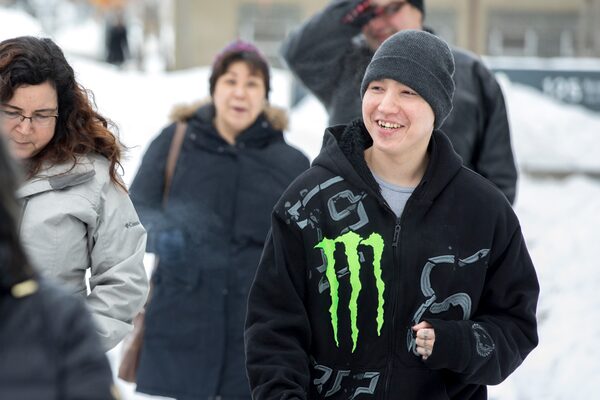
Adam Capay, surrounded by family members, smiles after exiting the Thunder Bay courthouse on Monday.David Jackson
The saga of Adam Capay, already extraordinary by any measure, took on a whole new dimension on Monday when a judge in Thunder Bay stayed the first-degree murder charge that had kept Mr. Capay behind bars for six-and-a-half years, including a shocking four-and-a-half years in solitary confinement.
Mr. Capay was charged in the stabbing death of Sherman Quisses, who died in June, 2012, after a violent altercation in an Ontario provincial jail. First-degree murder is an exceptionally serious charge and not one a judge is normally likely to stay when the Crown wants to take it to trial.
However, the prison system’s pretrial mistreatment of Mr. Capay was so long and so severe that, when his conditions of incarceration became public, it immediately raised questions of how this could have happened – and whether he could even stand trial.
It is truly difficult to fathom that Mr. Capay’s treatment at the hands of the Canadian state could have been egregious and so illegal, that pulling the plug on his trial was the only remedy.
And yet that appears to be the case.
The ruling by Justice John Fregeau is subject to a publication ban until at least Feb. 27, the deadline for an appeal. But the media can report that the proceedings against Mr. Capay were stayed “as a remedy for breaches of his Charter rights under ss. 7, 9, 12 and 15 of the Charter.” Those clauses guarantee life, liberty and security of the person, and protect against discrimination, arbitrary detention and cruel and unusual punishment.
Drily describing Mr. Capay’s Charter rights as having been violated barely scratches the surface of what he was put through.
Until the full judgment is released, it will be impossible to know the judge’s thinking. But there is enough public information about the case to state without reservation that the ruling, while correct, is a tragedy for all concerned.
First, there is the family of Mr. Quisses, the Indigenous man who was murdered in prison in 2012, just 18 days before his release. His child and remaining family may never see anyone go to trial in connection with the death of their loved one. They have been deprived of an essential right and of an important step in the healing that follows so terrible a loss. The system has not given them justice.
Then there is Mr. Capay. His plight came to light in 2016 after a prison guard alerted Ontario’s chief human rights commissioner, Renu Mandhane, that an inmate was languishing in solitary confinement in a provincial prison in Thunder Bay.
When Ms. Mandhane looked into it, she discovered that Mr. Capay had been in solitary for four-and-a-half years. At the time, he was being housed on an otherwise empty wing of the institution, in a cell lined with Plexiglas sheets, with the lights kept on 24 hours a day.
In all, Mr. Capay spent 1,636 consecutive days in solitary – far, far beyond the 15-day limit that is considered safe and humane by the United Nations. Ms. Mandhane said he appeared to have memory and speech problems brought on by his prison conditions.
As well, Mr. Capay had never gone to trial on the murder charge. The Supreme Court of Canada has ruled that any delay between the laying of charges and the completion of trial longer than 30 months is a Charter violation; Mr. Capay had at that point been held without trial for 52 months.
Mr. Capay was robbed of his most basic human rights. He was put into hole and left there; in Canada, this is not supposed to happen to any accused person, or even to someone convicted of a crime. That he was able to walk out of jail a free man this week for the first time since 2013 does little to compensate him for the mistreatment he suffered at the hands of the government.
The final victim in this is the Canadian public. Canadians would like to think that, if a major crime is committed, our justice system can find the accused, detain them in humane conditions, lay the proper charges and carry out a fair trial within a reasonable amount of time. Canadians expect it. The Charter demands it.
Yet in the case of Sherman Quisses and Adam Capay, the system failed on every one of those counts. It failed the accused, it failed the victim and it failed Canadians.